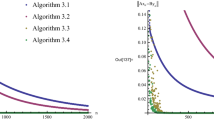Abstract
The multiple-sets split equality problem, a generalization and extension of the split feasibility problem, has a variety of specific applications in real world, such as medical care, image reconstruction, and signal processing. It can be a model for many inverse problems where constraints are imposed on the solutions in the domains of two linear operators as well as in the operators’ ranges simultaneously. Although, for the split equality problem, there exist many algorithms, there are but few algorithms for the multiple-sets split equality problem. Hence, in this paper, we present a relaxed two points projection method to solve the problem; under some suitable conditions, we show the weak convergence and give a remark for the strong convergence method in the Hilbert space. The interest of our algorithm is that we transfer the problem to an optimization problem, then, based on the model, we present a modified gradient projection algorithm by selecting two different initial points in different sets for the problem (we call the algorithm as two points algorithm). During the process of iteration, we employ subgradient projections, not use the orthogonal projection, which makes the method implementable. Numerical experiments manifest the algorithm is efficient.
Similar content being viewed by others
References
Censor, Y., Motova, A., Segal, A.: Perturbed projections and subgradient projections for the multiple-sets split feasibility problem. J. Math. Anal. Appl. 327, 1244–1256 (2007)
Censor, Y., Segal, A.: On string-averaging for sparse problems and on the split common fixed point problem. Contemp. Math. 513, 125–142 (2010)
Censor, Y., Segal, A.: The split common fixed point problem for directed operators. J. Convex Anal. 16, 587–600 (2009)
Dang, Y., Gao, Y.: The strong convergence of a KM-CQ-like algorithm for split feasibility problem. Inverse Prob. 27, 015007 (2011)
Yang, Q.: The relaxed CQ algorithm solving the split feasibility problem. Inverse Prob. 20, 1261–1266 (2004)
Zhang, W., Han, D., Li, Z.: A self-adaptive projection method for solving the multiple-sets split feasibility problem. Inverse Prob. 25, 115001 (2009)
Attouch, H., Bolte, J., Redont, P., Soubeyran, A.: Alternating proximal algorithms for weakly coupled minimization problems. Applications to dynamical games and PEDs. J. Convex Anal. 15, 485–506 (2008)
Censor, Y., Bortfel, D., Martin, B., Trofimov, A.: A unified approach for inversion problems in intensity-modulated radiation therapy. Phys. Med. Biol. 51, 2353–2365 (2006)
Censor, Y., Elfving, T., Kopf, N., Bortfeld, T.: The multiple-sets split feasibility problem and its applications for inverse problems. Inverse Prob. 21, 2071–2084 (2005)
Moudafi, A.: Alternating CQ-algorithm for convex feasibility and split fixed point problems, J. Nonlinear Convex Anal.
Moudafi, A.: A relaxed alternating CQ-algorithm for convex feasibility problems. Nonlinear Anal. 79, 117–121 (2013)
Bauschke, H.H., Jonathan, M.: On projection algorithms for solving convex feasibility problems. SIAM Rev. 38, 367–426 (1996)
Gao, Y.: Nonsmooth Optimization (In Chinese). Science Press, Beijing (2008)
Bauschke, H.H., Combettes, P.L.: Convex Analysis and Monotone Operator Theory in Hilbert Spaces, Springer-Verlag (2011)
Zarantonello, E.H.: Projections on Convex Sets in Hilbert Space and Spectral Theory. Contributions to Nonlinear Functional Analysis. In: Zararntonello, E.H. (ed.), vol. 20. Academic, New York (1971)
Acknowledgements
This work was supported by the Natural Science Foundation of Shanghai (14ZR1429200) and Innovation Program of Shanghai Municipal Education Commission (15ZZ073, 15ZZ074).
Author information
Authors and Affiliations
Corresponding author
Rights and permissions
About this article
Cite this article
Dang, Yz., Yao, J. & Gao, Y. Relaxed two points projection method for solving the multiple-sets split equality problem. Numer Algor 78, 263–275 (2018). https://doi.org/10.1007/s11075-017-0375-0
Received:
Accepted:
Published:
Issue Date:
DOI: https://doi.org/10.1007/s11075-017-0375-0



